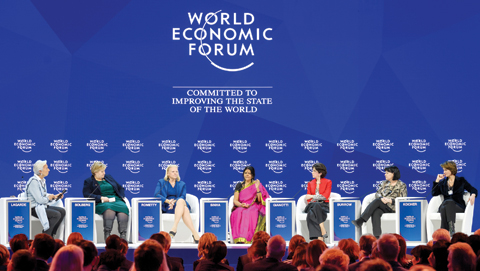DAVOS: Senior US officials hit back yesterday against suggestions that Donald Trump's "America First" agenda was hurting globalization and trade, setting an aggressive tone ahead of the US president's visit to the World Economic Forum. In keeping with Trump's combative trade stance, US Treasury Secretary Steven Mnuchin also welcomed a weaker US dollar, helping to send the world's reserve currency to a three-year low against a basket of major peers.
"Obviously a weaker dollar is good for us as it relates to trade and opportunities," Mnuchin told a press briefing at the annual summit in the Swiss ski resort of Davos. World leaders, including Indian Prime Minister Narendra Modi, Canada's Justin Trudeau and Brazilian President Michel Temer, raised concerns this week at the summit about growing protectionism, in remarks that delegates said seemed aimed at Trump's policies.
Under his America First agenda, Trump has threatened to withdraw from the North American free-trade agreement (NAFTA), disavowed the global climate change accord and criticized global institutions including the United Nations and NATO. Trump is expected to arrive today and deliver a keynote address to the forum tomorrow, mingling with the same elite "globalists" that he bashed during his 2016 presidential run.
Mnuchin and US Commerce Secretary Wilbur Ross mounted a joint defense of Washington's aggressive trade actions in Davos yesterday and said more were to come. "This is about an America First agenda. But America First does mean working with the rest of the world," Mnuchin said. "It just means that President Trump is looking out for American workers and American interests no different than he expects other leaders would look out for their own."
Ross said US trade actions were provoked by "inappropriate behavior on the part of our trading counterparties."
On Tuesday, for example, the United States slapped steep import tariffs on washing machines and solar panels, in moves billed as a way to protect American jobs. China and South Korea condemned the tariffs, with Seoul set to complain to the World Trade Organization over the "excessive" move. "Many countries are very good at the rhetoric of free trade but in fact actually practice extreme protectionism," Ross said.
The slide in the dollar also helps US exports, but Mnuchin noted: "Longer term the strength of the dollar is a reflection of the strength of the US economy and the fact that it is and it continues to be the primary currency in terms of the reserve currency."
Almost a decade after the Lehman crisis, the world's financial elite in Davos say not to worry about a potential bubble inflating out of record stock prices: this time it's different.
The global economy is finally firing on all cylinders and for bosses gathered in Davos, any risks to the bull market arise more from terrorism or cyberattacks than from the sort of panic that engulfed investment bank Lehman Brothers in September 2008, triggering a worldwide crisis.
"I'm not going to tell you that we're not going to have another financial crisis, sales of my book would collapse," said Harvard economics professor Kenneth Rogoff, the author of a book on the crisis called "This Time It's Different", which warned of the dangers of complacency. "But I'm kind of optimistic going forward.. and I actually think we're at the tail end of the last one (crisis)," he said in Davos. Still, talk of a bubble is re-emerging as the US stock prices ramp up to historic levels. Wall Street's closely watched S&P 500 is up nearly five percent so far this year, and it's still only January.
Collaboration between banks and regulators "is at a whole other level than it was pre-crisis", Barclays chief executive Jes Staley told a Davos panel. "If you go back to 2005, 2006, the bank would meet with the Fed (Federal Reserve) maybe once every quarter. Today we have the (regulators) in the bank everyday," he said.
'Quacks like a duck'
Others pointed at lurking dangers that could reboot a crisis. "Of course you have some housing bubbles again in some selected markets," Angel Gurria, the head of the Organisation for Economic Cooperation and Development, told AFP. But Gurria said the soaring stock markets, especially in the US, were linked to widespread enthusiasm about Trump's tax cut.
"Imagine the combination. Lower taxes on corporations, repatriation for investment and a big infrastructure program," he said. "That looks and tastes and quacks like a duck; it looks like what you are going to have is growth." But this vision of the economy was too "short term", he said, a view shared by insurance giant Allianz CEO Oliver Baete.
"Underlying growth ... has been much better than people predicted. That's the good news despite all the political turmoil," Baete told CNBC in Davos."But .. markets are very, very dangerous, and you don't see that, because valuations are at ever-higher levels, and credit risk looks like it's disappeared. Well, it hasn't disappeared," he warned. But to many in Davos, the markets will only fall back to earth due to unforeseen external shocks.-AFP



